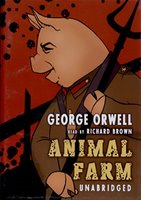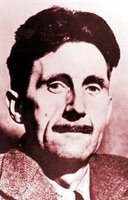
 George Orwell's
George Orwell's Animal Farm
Although Orwell aims his satire at totalitarianism in all of its external appearances — communism, fascism, and capitalism, Animal Farm owes its structure largely to the events of the Russian Revolution as they unfolded between 1917 and 1944, when Orwell was writing the novella. Much of what happens in the novella symbolically parallels specific developments in the history of Russian communism, and several of the animal characters are based on either real participants in the Russian Revolution or a mixture thereof. Due to the universal relevance of the novella’s themes, once doesn't need to possess an encyclopedic knowledge of Marxist Leninism or Russian history in order to appreciate Orwell’s satire of them. However, an acquaintance with certain facts from Russia’s past, however, can be helpful in understand the Orwell's criticism.
Animal Farm, known at the beginning and the end of the novel as the Manor Farm, symbolizes Russia and the Soviet Union under Communist Party rule. But more generally, Animal Farm stands for any human society, be it capitalist, socialist, fascist, or communist. It possesses the internal structure of a nation, with a government (the pigs), a police force or army (the dogs), a working class (the other animals), and state holidays and rituals. Its location amid a number of hostile neighboring farms supports its symbolism as a political entity with diplomatic concerns.
I found the novel to be quite simple, actually which is probably why it has been a required read for high-school students. Themes contained within the novel are easy to identify, such as, the corruption of socialist ideals in the Soviet Union, the societal tendency toward class stratification, the danger of a naïve working class, and the abuse of language as instrumental to the abuse of power.
Animal Farm is filled with songs, poems, and slogans to serve as propaganda, one of the major conduits of social control. By making the working-class animals speak the same words at the same time, the pigs evoke an atmosphere of grandeur and nobility associated with the recited text’s subject matter. The songs also erode the animals’ sense of individuality and keep them focused on the tasks by which they will purportedly achieve freedom.
The last chapter of Animal Farm brings the novel to its logical, unavoidable, yet chilling conclusion. The pigs wholly consolidate their power and their totalitarian, communist dictatorship completely overwhelms the democratic-socialist ideal of Animal Farm. Napoleon and the other pigs who have taken control have become identical to the human farmers they had overthrown, just as Stalin and the Russian communists eventually became indistinguishable from the aristocrats whom they had replaced and the Western capitalists whom they had denounced.



No comments:
Post a Comment